
How Finance Made Civilization Possible feat. William Goetzmann
 2022-06-24
2022-06-24
It's a bold claim. And people outside of financial history might wonder how this could possibly be true.
Will Goetzmann will elaborate on this claim in today’s episode. He is the Edwin J. Beinecke Professor of Finance and Management Studies and Faculty Director of the International Center for Finance at the Yale School of Management. Will’s current research focuses on alternative investing, factor investing, behavioral finance and the art market.
Will has written and co-authored a number of books, including “Modern Portfolio Theory and Investment Analysis,” “The Origins of Value: The Financial Innovations that Created Modern Capital Markets,” and most recently, “Money Changes Everything: How Finance Made Civilization Possible.”
Will and Greg talk in this episode about jurors in Athens, slave ownership and early banks, outsourcing public administration in ancient Rome and modern times and making career a switch from art history to operations research to finance.
Episode Quotes:Why is financial history important to know and study?
For me, I'm always interested in where do things come from and why they matter. And I try to focus on the sort of bigger picture of the implications of having these tools. And I think that that's an important thing. You can only get it through history, because it takes time for things to play out.
On having an unconventional career path
I've always had an omnivorous curiosity. Perhaps un-controlled. And so in some sense, I followed opportunities, as opposed to having a one goal in life. So there's a whole spectrum of different kinds of people. I'm one that has done lots of different kinds of things.
Preservation of the state
One way you could break down different kinds of governments along the fault line of finance would be to look at some of the city states they emerged in Europe as a merchant driven, merchant owned, merchant controlled.
- Carl Menger - Wikipedia
- Ulrike Malmendier's Homepage
- The River Lek
- K. Geert Rouwenhorst | Yale School of Management
- John Ingersoll
- Faculty Profile at Yale School of Management
- Professional Profile at National Bureau of Economic Research
- Will Goetzmann on LinkedIn
- Will Goetzmann on Twitter
- Will Goetzmann on Google Scholar
- Money Changes Everything: How Finance Made Civilization Possible
- The Origins of Corporations: The Mills of Toulouse in the Middle Ages
- The Origins of Value: The Financial Innovations That Created Modern Capital Markets
- The Great Mirror of Folly: Finance, Culture, and the Crash of 1720
- Modern Portfolio Theory and Investment Analysis
- The Equity Risk Premium: Essays and Explorations
More Episodes
Create your
podcast in
minutes
- Full-featured podcast site
- Unlimited storage and bandwidth
- Comprehensive podcast stats
- Distribute to Apple Podcasts, Spotify, and more
- Make money with your podcast
It is Free
- Privacy Policy
- Cookie Policy
- Terms of Use
- Consent Preferences
- Copyright © 2015-2024 Podbean.com






